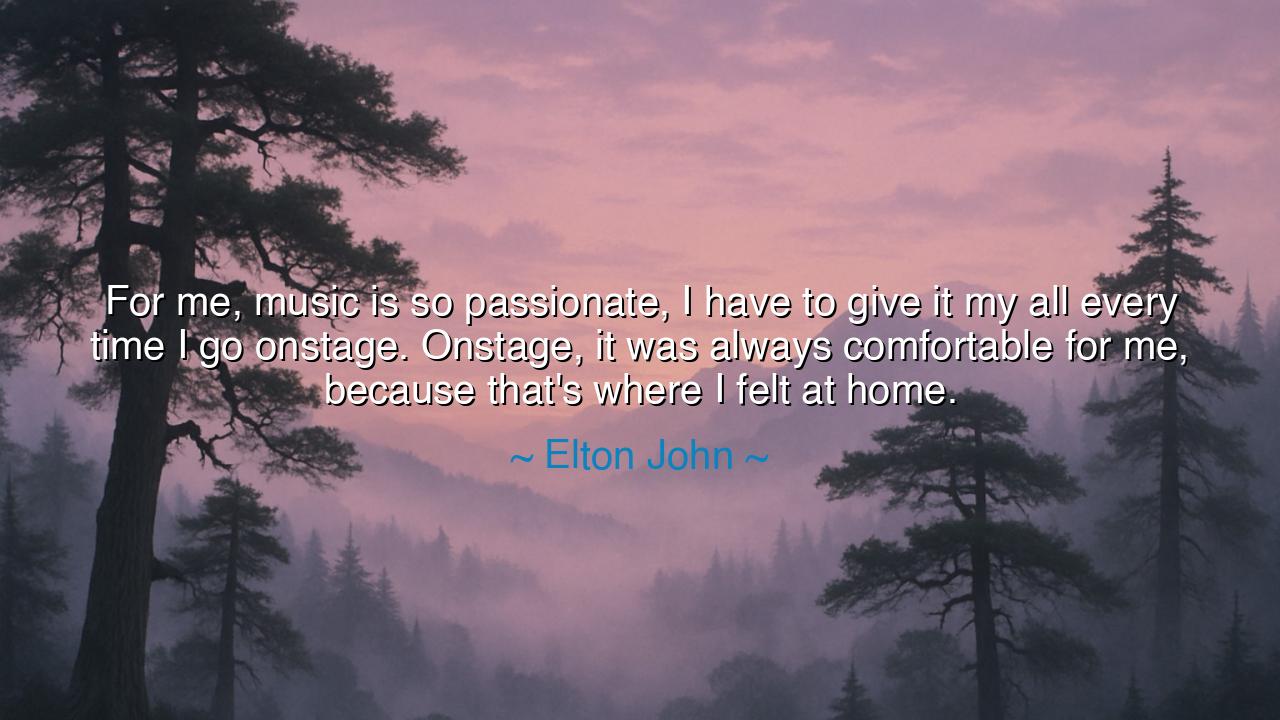
For me, music is so passionate, I have to give it my all every
For me, music is so passionate, I have to give it my all every time I go onstage. Onstage, it was always comfortable for me, because that's where I felt at home.






The words of Elton John — “For me, music is so passionate, I have to give it my all every time I go onstage. Onstage, it was always comfortable for me, because that’s where I felt at home.” — are the confession of a soul wholly devoted to its purpose. In these words burns the fire of the artist’s calling, that sacred compulsion to give one’s entire being to a craft that transcends mere performance. Beneath their simplicity lies the ancient truth that when passion and purpose are one, the work becomes not labor but life itself. Elton John does not speak of music as profession or duty, but as home — the sacred space where his spirit breathes most freely, where the fragmented pieces of self are made whole through sound and song.
When he says he must “give it my all every time,” he echoes the ethos of every true creator and performer since time immemorial — that art demands total surrender. The Greeks would have called this enthousiasmos — to be “possessed by the divine,” to become the vessel through which a god or muse speaks. For Elton John, that god is music itself — wild, merciful, and consuming. To stand upon the stage is, for him, not to act, but to return to the temple of his own soul. The applause, the lights, the spectacle — these are but reflections of a deeper communion, the moment when the artist and the art become one. To hold back, to perform without full devotion, would be a kind of betrayal — not to the audience, but to himself.
In this, his experience mirrors that of the ancient bards — the rhapsodes of Greece or the skalds of the North — who sang not for fame, but because they could not do otherwise. Music and poetry were their lifeblood, their means of shaping chaos into meaning. So too for Elton John, whose life, often marked by struggle and transformation, finds its center on the stage. It is there, amid melody and movement, that his passion becomes peace, and his vulnerability becomes strength. To give his all is not exhaustion but renewal, for in giving completely, he is restored — as though the act of creation itself keeps his spirit alive.
We can see a parallel in the story of Ludwig van Beethoven, who, though deaf in his later years, continued to compose works of unparalleled beauty. When others might have surrendered to despair, Beethoven poured his pain into his music, and through that offering found transcendence. He too was at home only in his art — though his physical ears failed him, his inner hearing was divine. Like Elton John, he understood that passion is both wound and healing, both burden and salvation. The artist gives all, not because the world demands it, but because the heart would break if it did not.
Elton John’s declaration that he feels “comfortable onstage” reveals something even more profound — that the place of greatest exposure is, paradoxically, the place of greatest safety. For most, the stage is a place of fear — of judgment, of vulnerability. But for him, it is sanctuary. The stage is where the masks of daily life fall away, and truth takes form through song. There, he is not the celebrity nor the spectacle, but simply the self in its purest expression. In that space, every note becomes a heartbeat, every lyric a fragment of soul. The comfort he speaks of is not ease, but belonging — the peace that comes from standing exactly where one was always meant to be.
There is in this also a lesson for all who seek purpose, whether in art, labor, or love. To find one’s home — that sacred place where passion and purpose unite — is to find life’s meaning. It may not be a physical stage or a musical instrument; it may be the classroom, the field, the workshop, or the home itself. But wherever it is found, one must give oneself wholly, as Elton John gives himself to music. For half-hearted living is no life at all. The ancient philosophers taught that excellence (areté) is achieved not through possession, but through full participation — by pouring one’s soul into every act, until the act itself becomes sacred.
The lesson, then, is clear and radiant: find what makes your spirit come alive, and when you find it, give it your all. Do not hold back out of fear or fatigue. Give until you are emptied, for only then will you be filled anew. Passion is not the enemy of peace; it is its source. The stage, for Elton John, is his sanctuary — not because it shields him from the world, but because it connects him to it through the universal language of song. Let us each find our own stage, our own art, our own way of giving — and when we stand there, let us stand as he does: fearless, wholehearted, and utterly at home.
For in the end, the world belongs to those who live passionately, who give fully, who turn their work into worship. As Elton John teaches, to give all is not to lose oneself, but to discover the self completely — to find in one’s labor the quiet truth of belonging, and to dwell there, as in the truest home.






AAdministratorAdministrator
Welcome, honored guests. Please leave a comment, we will respond soon